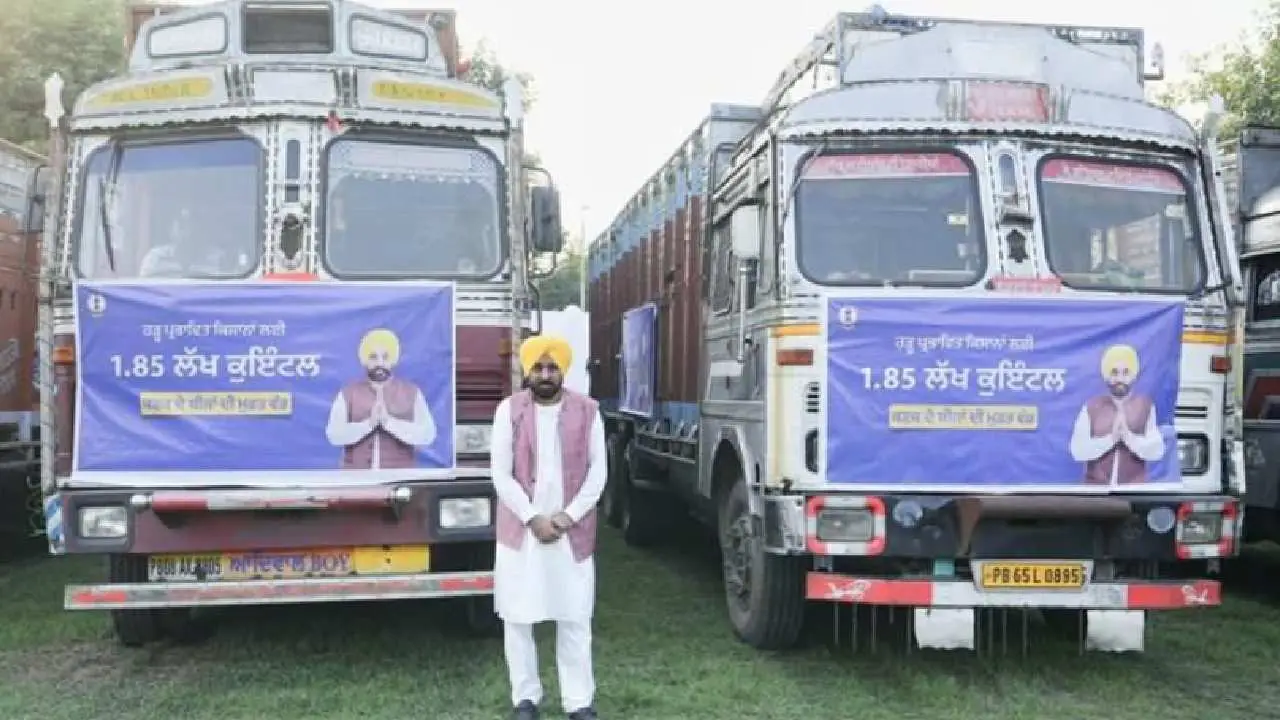
CM Mann: Rs 1.85 Lakh Quintals of Wheat Seed Delivered to Farmers, Approximately Rs 74 Crore Spent (TIN)
Punjab: Perhaps for the first time in Punjab's history, a Chief Minister personally inaugurated the delivery of aid to farmers by flagging off trucks. On Sunday in Amritsar, Chief Minister Bhagwant Mann sent off seven trucks loaded with wheat seeds toward the flood-affected districts. These trucks carried not just seeds, but hope and a new life for millions of farmers. Two lakh quintals of wheat seeds, valued at Rs 74 crore, are being distributed completely free of cost.
When the floods devastated Punjab, farmers were left with nothing but tears. Standing crops across five lakh acres were submerged in water. Months of hard work were washed away. Farmers, already burdened with debt, began contemplating suicide. However, the government made a timely decision, and now, before the start of the Rabi sowing season, the work of delivering seeds directly into the hands of the farmers has begun. These seeds will be given to them directly in their villages without any paperwork.
Chief Minister Bhagwant Mann emotionally stated, "Our farmers are the backbone of this country. Even when the whole nation sleeps, the farmer is awake in his fields. It is his hard work that feeds the country. When he is in trouble today, how can we step back? This is not just Rs 74 crore; this is our government's respect for the farmers." He further added that Punjab's farmers played a key role in the Green Revolution and provided food security to the nation, and now it is the government's duty to help them.
The scale of the flood destruction sends shivers down the spine. Over 2,300 villages across Punjab were submerged. More than 20 lakh people were affected. The saddest part was the loss of 56 innocent lives. Around seven lakh people were left homeless and had to stay in relief camps. Children's education stopped, the elderly were deprived of medicine, and women had no place to cook food. This disaster was the most horrific in Punjab's history.
Education and health services also bore the brunt of the floods. 3,200 government schools were completely damaged. 19 college buildings were reduced to rubble, halting the education of millions of children. Additionally, 1,400 clinics and hospitals were also destroyed, forcing patients to travel long distances for treatment. Several critically ill patients died due to lack of timely medical care. This was not just a loss of buildings, but the entire system was collapsed.
The damage to infrastructure reveals the magnitude of the disaster. 8,500 kilometers of roads were completely washed away or broken. 2,500 bridges collapsed, cutting off villages from cities. Delivering rations, medicines, and essential supplies became difficult. Electricity poles fell, transformers burned out, and people had to live in darkness for weeks. Water taps ran dry because the pumps were damaged. Life was completely disrupted.
The initial estimate for the total loss is Rs 13,800 crore. However, the real damage could be much higher. The loss of crops, the death of livestock, the destruction of homes, and the washing away of shops, it is difficult to calculate all this. Many farmers reported that their life's savings were ruined in a single night. Those who took bank loans for farming are no longer in a position to repay them. Therefore, the government decided to provide immediate relief.
But the farmers of Punjab are not ones to give up. History testifies that the people of Punjab have faced every adversity and have always bounced back. During the partition, the period of militancy, and now the floods, Punjabis rebuild everything with their hard work and courage. As the floodwaters receded, farmers immediately returned to their fields. They cleaned the mud, prepared the fields, and are now ready for the Rabi sowing. They just needed the seeds, and the government has provided that.
The Chief Minister concluded, "This is just the beginning. We will provide all possible help to the farmers. Compensation, debt waiver, new schemes—everything will be done. In the coming weeks, seeds will reach all flood-affected farmers. And then you will see how the fields of Punjab flourish once again. Our farmers are the pride of the nation, and we will stand with them every step of the way. This is the promise of the Punjab government." A new wave of hope has now swept across the state.





Copyright © 2026 Top Indian News
